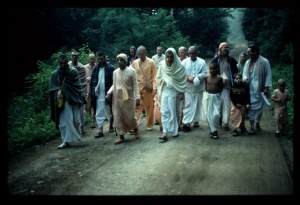SB 12.8.2-5

A.C. Bhaktivedanta Swami Prabhupada
Please note: The synonyms, translation and purport of this verse were composed by disciples of Śrīla Prabhupāda
TEXTS 2-5
- āhuś cirāyuṣam ṛṣiṁ
- mṛkaṇḍu-tanayaṁ janāḥ
- yaḥ kalpānte hy urvarito
- yena grastam idaṁ jagat
- sa vā asmat-kulotpannaḥ
- kalpe 'smin bhārgavarṣabhaḥ
- naivādhunāpi bhūtānāṁ
- samplavaḥ ko 'pi jāyate
- eka evārṇave bhrāmyan
- dadarśa puruṣaṁ kila
- vaṭa-patra-puṭe tokaṁ
- śayānaṁ tv ekam adbhutam
- eṣa naḥ saṁśayo bhūyān
- sūta kautūhalaṁ yataḥ
- taṁ naś chindhi mahā-yogin
- purāṇeṣv api sammataḥ
SYNONYMS
āhuḥ — they say; cira-āyuṣam — having an extraordinarily long life span; ṛṣim — the sage; mṛkaṇḍu-tanayam — the son of Mṛkaṇḍu; janāḥ — people; yaḥ — who; kalpa-ante — at the end of the day of Lord Brahmā; hi — indeed; urvaritaḥ — remaining alone; yena — by which (annihilation); grastam — seized; idam — this; jagat — entire universe; saḥ — he, Mārkaṇḍeya; vai — indeed; asmat-kula — in my own family; utpannaḥ — born; kalpe — in the day of Brahmā; asmin — this; bhārgava-ṛṣabhaḥ — the most eminent descendant of Bhṛgu Muni; na — not; eva — certainly; adhunā — in our age; api — even; bhūtānām — of all creation; samplavaḥ — annihilation by flood; kaḥ — any; api — at all; jāyate — has arisen; ekaḥ — alone; eta — indeed; arṇave — in the great ocean; bhrāmyan — wandering; dadarśa — he saw; puruṣam — a personality; kila — it is said; vaṭa-patra — of a banyan leaf; puṭe — within the fold; tokam — an infant hoy; śayānam — lying; tu — but; ekam — one; adbhutam — wonderful; eṣaḥ — this; naḥ — our; saṁśayaḥ — doubt; bhūyān — great; sūta — O Sūta Gosvāmī; kautūhalam — curiosity; yataḥ — due to which; tam — that; naḥ — for us; chindhi — please cut; mahā-yogin — O great yogī; purāneṣu — of the Purāṇas; api — indeed; sammataḥ — universally accepted (as the expert knower).
Translation and purport composed by disciples of Śrīla Prabhupāda
TRANSLATION
Authorities say that Mārkaṇḍeya Ṛṣi, the son of Mṛkaṇḍu. was an exceptionally long-lived sage who was the only survivor at the end of Brahmā's day, when the entire universe was merged in the flood of annihilation. But this same Mārkaṇḍeya Ṛṣi, the foremost descendant of Bhṛgu, took birth in my own family during the current day of Brahmā, and we have not yet seen any total annihilation in this day of Brahmā. Also, it is well known that Mārkaṇḍeya while wandering helplessly in the great ocean of annihilation, saw in those fearful waters a wonderful personality—an infant boy lying alone within the fold of a banyan leaf. O Sūta, I am most bewildered and curious about this great sage, Mārkaṇḍeya Ṛṣi. O great yogī, you are universally accepted as the authority on all the Purāṇas. Therefore kindly dispel my confusion.
PURPORT
Lord Brahmā's day, consisting of his 12 hours, lasts 4 billion 320 million years, and his night is of the same duration. Apparently Mārkaṇḍeya lived throughout one such day and night and in the following day of Brahmā continued living as the same Mārkaṇḍeya. It seems that when annihilation occurred during Brahmā's night, the sage wandered throughout the fearful waters of destruction and saw within those waters an extraordinary personality lying on a banyan leaf. All of these mysteries concerning. Mārkaṇḍeya will be clarified by Sūta Gosvāmī at the request of the great sages.